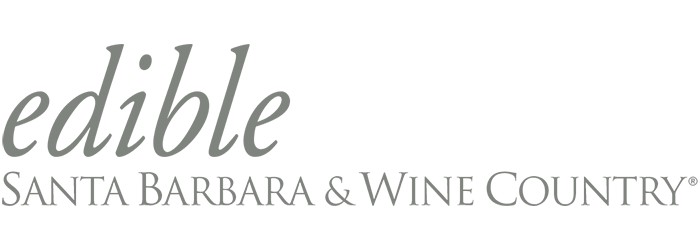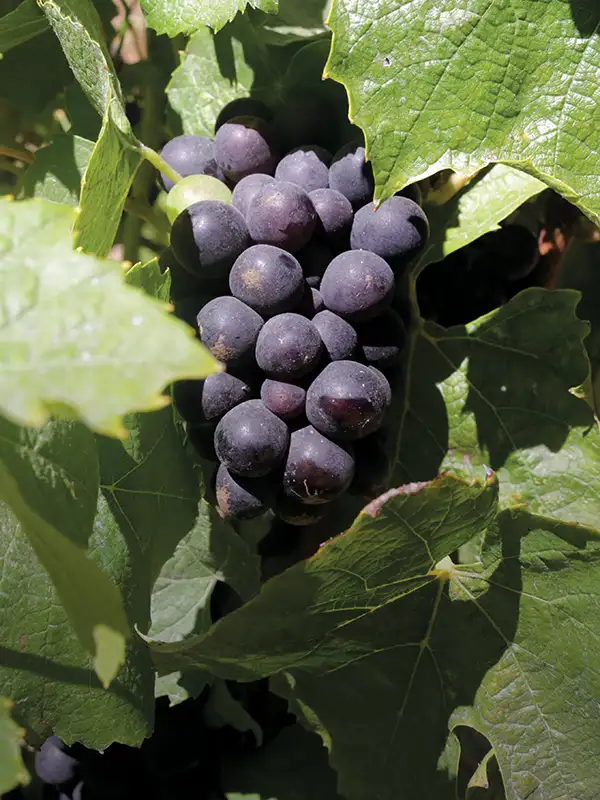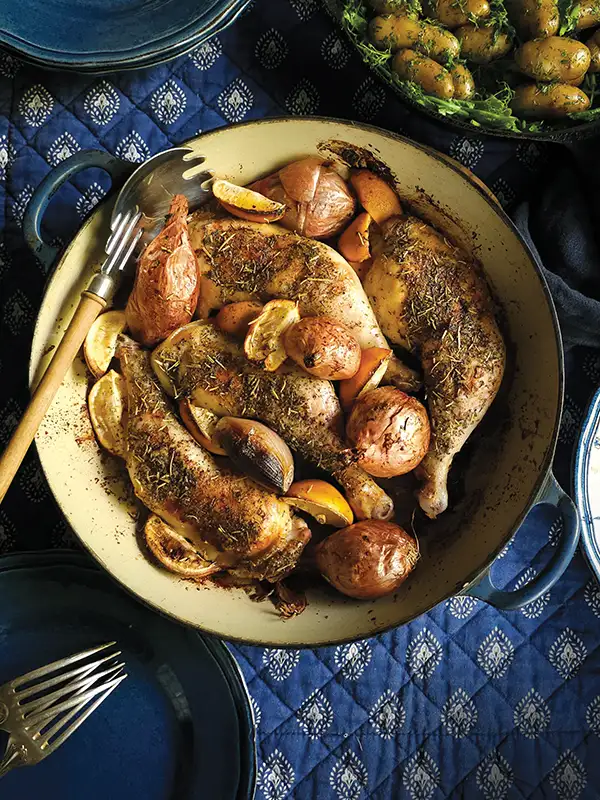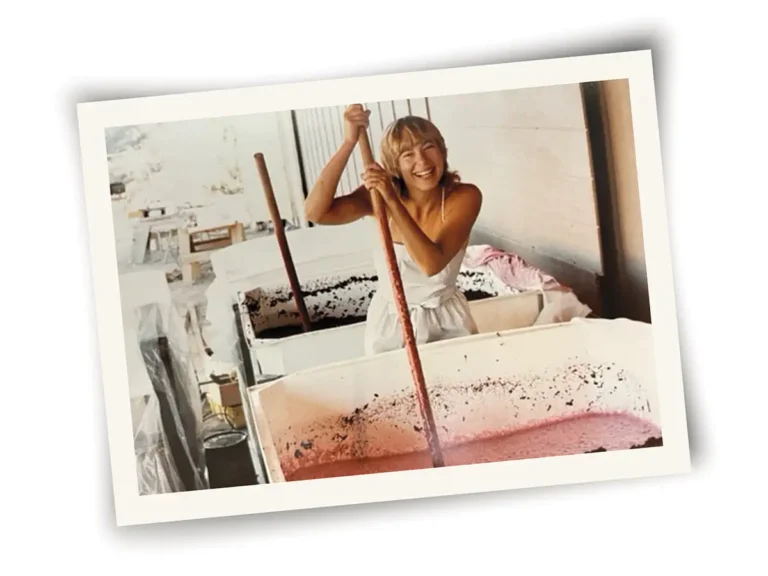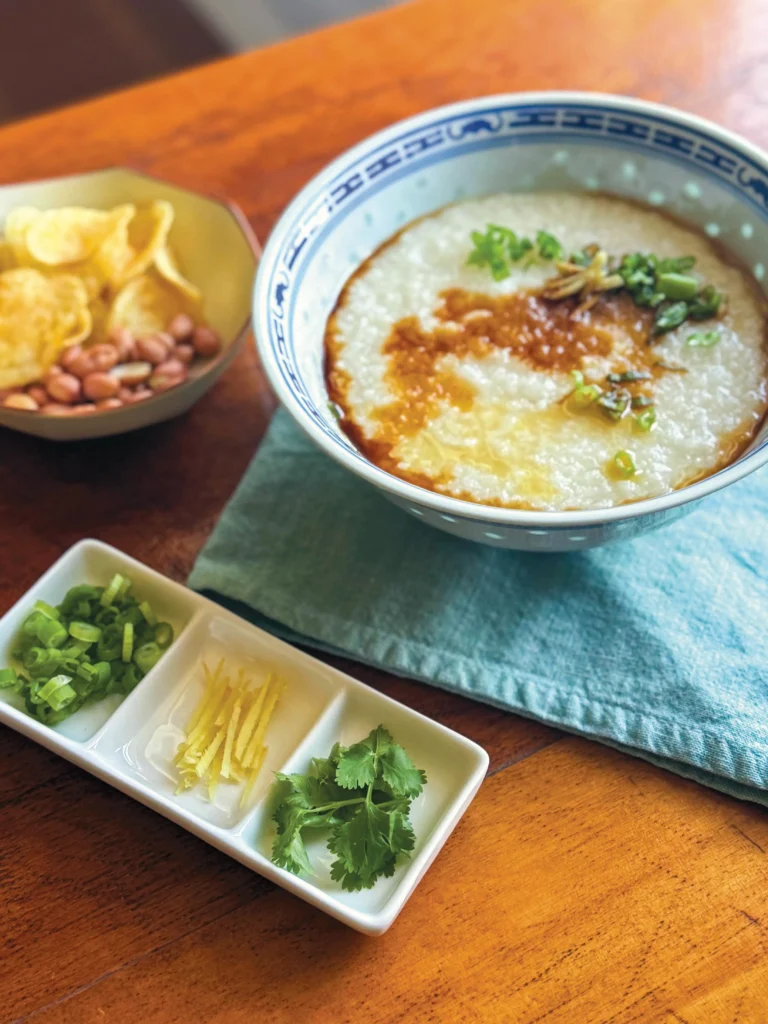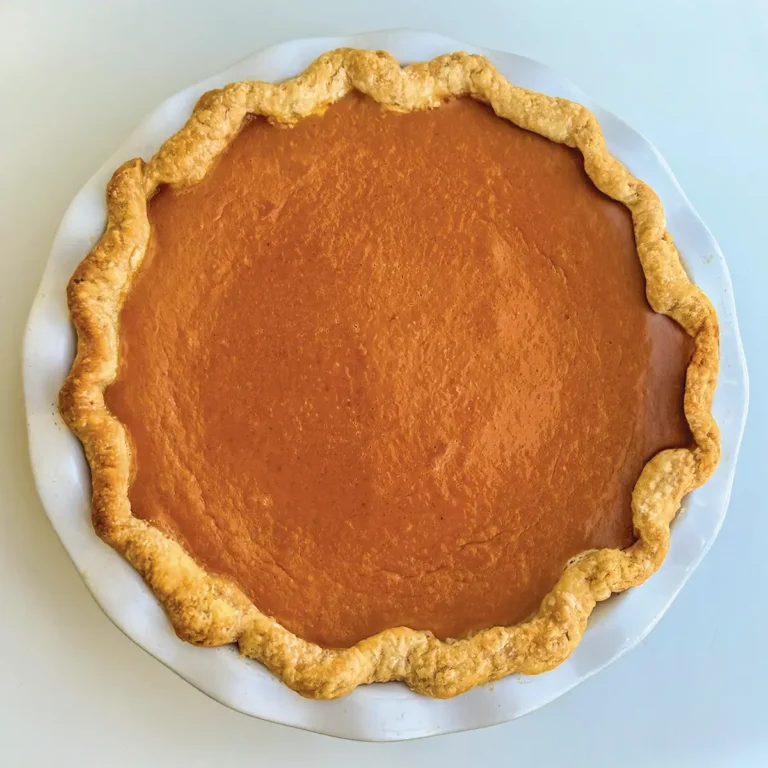Raise High the Pig Farms
Santa Barbara County
[Photography by Rosminah Brown]
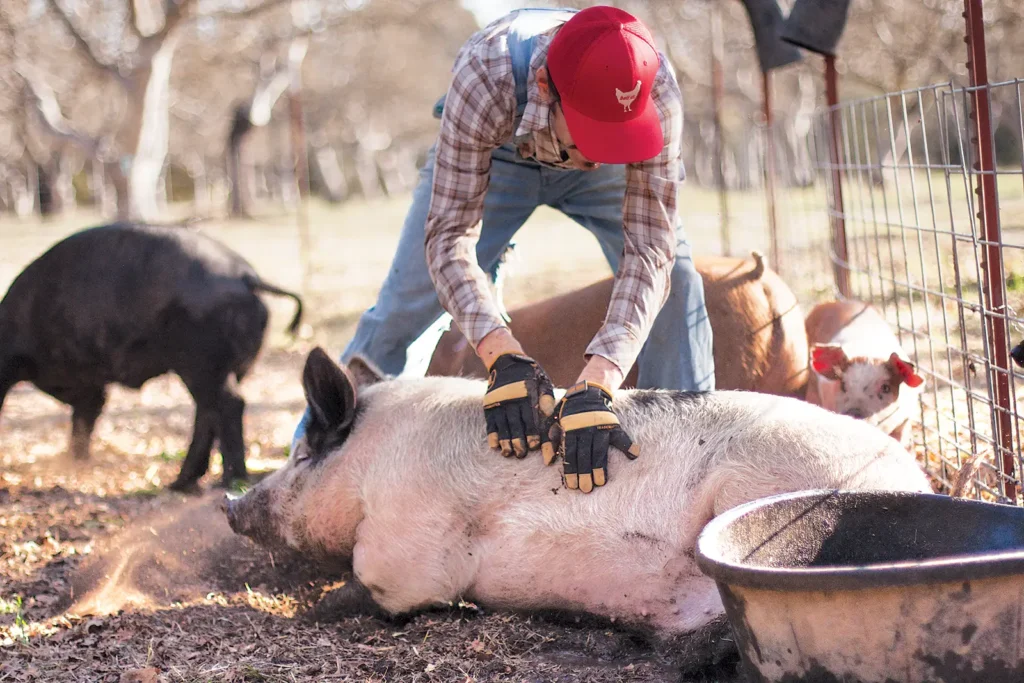
Pork has seen a resurgence in popularity, starting with the ubiquitous and delicious bacon we see across meals from breakfast to dessert, and expanding into the delectable world of salumi, sausages, cured meats. And have BBQ spare ribs and grilled pork chops ever been out of fashion?
Pork is incredibly versatile, with a tender flavor that can pair equally well with sweet fruit or with full-bodied wines and fiery spices. And we owe our thanks for this delicious meat to the pig.
We now recognize that the fullest flavor of pork, as well as all edible flora and fauna, comes from organic sources, raised naturally and the closer we source our ingredients, the more connected and respectful we are to the food that nourishes us. There have long been farms providing us with local, organic and ethically raised pigs, with a special shout out to Jimenez Family Farm in the Santa Ynez Valley, but in recent years Santa Barbara County has seen some new piggeries popping up.
Whether it’s a special heritage breed or a sustainable farming technique, each brings a special approach to raising their pigs. Here are three new stars, rising up to meet the county’s tall order for locally sourced pork.
Valley Piggery
The Caretaker
Valley Piggery is run by Jake Francis. It is the smallest of the new pig farms, and the most hands-on. Jake operates his piggery as a mobile space in partnership with other landowners and takes special care in being well-connected to his animals. In this way, he seems more a ward, fostering each pig and ensuring they live happily until it is time for them to take the leap. He sets up temporary paddocks and rotates them around larger pieces of pasture and woodlands every one to two weeks, building simple roofs when they need special protection from the elements. Currently Valley Piggery has its home near Los Olivos in a private walnut grove off Ballard Canyon.
The pigs are, well, they’re pigs and they root up the ground within days, even hours. They always seem hungry, despite being very well fed. They are pigs! They are also intelligent, curious and sociable. Jake gets right in there with them, providing scritches and rolling them around much like we would with our favorite pets. He doesn’t raise one specific breed, but mostly acquires them through local connections, and all of them are heritage or heritage crosses such as Berkshire and Duroc. At any given time he’ll have a handful of different varieties. Each pig has a name and they certainly have their own personalities. When I first visited, the favorite of the lot was Malty, with a beautiful chocolate color to his coat, and long floppy ears that often obscured his eyes.
Jake runs his piggery as a CSA, and members invest in a share of a pig—five full shares per pig, which is approximately 25–35 pounds of pork in a share. Half shares are also possible, and these are 12–18 pounds of pork, freshly vacuum sealed and not yet frozen. An email is sent out when a pig becomes available and members can sign up to receive a share on an as-need basis. It is possible to make preferences for certain cuts known before committing to a share, but part of the joy of a CSA is receiving a variety of cuts and getting creative with them. All shares include a selection of fresh chops, roasts and sausages.
He can also make special arrangements for a whole pig roast or catering.
What makes Valley Piggery stand out is clearly the intimate care Jake invests in his pigs. He has respect for the pig’s social and inquisitive nature. He knows each pig and its personality, and he will take time each day to give each attention and keep them occupied with foraging challenges in as natural a state as possible, while being mindful that his paddock’s impact on the land remains beneficial to the landowner. Jake encourages people to come visit and see the pigs firsthand.
Being a one-man operation does mean there are limits to its scale, and for this reason Jake will always have a close hand in each pig that comes from his business. This means conscious and consistent quality pork for us. In the coming months, Jake will be growing his drove of pigs to nearly two dozen, and this will make more pork available in his CSA. This will also allow his Butchery Workshops to occur more frequently (see sidebar).
Valley Piggery to Chef
– Industrial Eats
Jake works closely with Jeff Olsson of Industrial Eats and New West Catering in Buellton. He also collaborates with Jeff for their pig butchery workshops, currently held about four times a year. The class is offered in two sessions over two days, each about four hours long. The first class is devoted to basic butchering: learning pig anatomy, separating the primals and breaking down these large pieces into manageable cuts like ribs, chops, shanks and hams. This is where the saws and large butchery knives are most involved and when the session first starts, the group gathers around a stainless steel table with two whole sides of a recently living pig lying across. It can be a startling sight to those who’ve grown up seeing their meat only in sterile styrofoam packets at the grocery story. Attendees are encouraged to participate in the cutting, becoming familiar with pig anatomy and popular cuts, and handling the butchering tools.
Winfield Farm
Heritage Serendipity
Winfield Farm is run by Bruce and Diane Steele. Bruce had a longtime dream to have a pig that would help consume surplus produce on his farm. What ended up happening was an explosion of pigs that’s resetting the course of the farm’s operations and helping bring a heritage breed back into popularity that was once on a path of dying out.
Bruce started out as an urchin diver and fisherman, and in 2003 became a land farmer in Buellton on Highway 246 about three miles west of Highway 101. Winfield Farm is most easily spotted by his pale blue fishing boat parked at the base of the driveway. The farm had been in land production for 10 years before Bruce’s dream of having a pig first became a reality.
The Steeles specialize in just one heritage breed, the Mangalitsa (pictured above), also called a Wooly Pig, and also known as a Lard Hog. The Mangalitsa stock hails from 19th century Eastern Europe. The Mangalitsa has exceptional fat and was the prize pork of Austro-Hungarian nobility at the turn of the century. Once you see how much fat is on its body, it’s a wonder this tenacious breed can move about quickly and easily at all.
The breed is considered rare, and it almost died out entirely. Because the Mangalitsa has so much lard, the breed was unpopular in the 1970s and ’80s when fat became unfashionable. Who remembers the ad campaign for “the other white meat?” It was almost extinction for the Mangalitsa. But thanks to the growing popularity of bacon and pork in general, a desire for rich flavor and unctuous texture in meat, and the recognition that genetic diversity is a good thing, the Mangalitsa is making a comeback and its smooth silky fat is now held in glorious esteem. Winfield Farm is currently the largest breeder of the Mangalitsa in Southern California.
The pigs are fed with fruit and vegetables from the farm with additional organic grain supplement. If Bruce sees an opportunity to feed them something local and readily available, he’ll give it to them. Like autumn acorns or winter squash. So much squash.
The Mangalitsa pigs seem to breed like crazy and the Steeles are excitedly incredulous at times that their initial investment in 2013 of a handful of pigs has become an increasing series of enclosures with their original pigs, then a serendipitous rescue of 13 additional Mangalitsas, plus their next generations. Now there’s new sets of spunky piglets that arrived over Christmastime, running around, squealing, rooting and foraging. They grow so quickly.
Bruce is often constructing new shelters for expectant sows to birth and nurse their young. It’s not all a fairy tale—the reality is that stillborns occur, and when some don’t make it due to a sudden cold snap or the lack of enough suckling teats to go around, it is upsetting to everyone. This is farm life and it comes with unanticipated death as well. As for their fondness of the Mangalitsa piglets, Bruce says with both a smile and a shake of his head, “they’re just so darned cute.”
Winfield Farm to Chef
– Full of Life Flatbread
Winfield supplies whole pigs by order to local restaurants, such as Full of Life Flatbread in Los Alamos. Chef/owner Clark Staub purchased a whole Mangalitsa last summer, and he and his staff broke it down and processed it entirely. The specials menu ran fresh Mangalitsa dishes for several weeks, while its legs were set to cure for longer-term projects, like smoked hams, speck and lardo that started to grace dinner plates this past February.
Sourcing locally is important to Full of Life, and the relationship between farmer and chef in this case is especially close—Clark lives just a few miles away from Winfield Farm off Highway 246 and passes it daily on his way to the restaurant. Not only do we have the opportunity to eat this spectacular pork prepared by one of our county’s favorite chefs, but the two are collaborating on recipes for an upcoming Mangalitsa cookbook. Something to watch out for!
Casitas Valley Creamery and Piggery
The Collaborators
On the surface, husband and wife team Jesse and Ana Smith run this operation, but it really is a full family business. Fourteen members of this extended family live on site, with the wider property called Regenerative Earth Farm.
The family bought the property in 2012 as a land and farm investment. It was an existing farm and the county’s only commercially approved creamery, which was featured in the fall 2013 issue of Edible Santa Barbara. Ana’s father, Warren Brush, a longtime expert in permaculture, helps oversee the farm operations alongside three family generations with sustainable, holistic techniques that connect people, food and nature with ecological health as the primary goal. They are in the process of converting the existing land over to permaculture operations. Currently, the property is 40 acres and approximately half is in farm production.
The breeds they focus on are of British heritage, designed to complement cheeses from the dairy. These breeds include Gloucestershire Old Spots, Tamworths, crossed with Red Wattles. Casitas prefers these domesticated breeds because of their docile, friendly temperament that is more compatible with the children present on their family farm. One thing Jesse points out is that, generally, the shorter the snout on a pig’s face, with floppy ears covering its eyes, the more gentle the breed tends to be.
Meanwhile, the pigs on the farm move in paddocks through the grounds and orchards, foraging the surplus of fallen or damaged apples, persimmons and other seasonal fodder that wouldn’t otherwise make it to the farm stand.
Casitas Valley Piggery to Chef
– Bacon & Brine
In keeping with the permaculture idealogy, where everything is connected and complementary, it is fitting to pair Casitas Valley with Bacon & Brine in Solvang. When Chef Pink was searching out local whole pig sources, the two companies bonded over their ideals and approach to livelihood, such as their investment in family, respect for their food sources and the internal and external forces which sustain them and being creative with all the raw ingredients.
Chef Pink and her partner, Courtney Rae, source 99% of their raw materials locally, paying a premium for products they trust from people they know. Ask either of them upfront where the current pork is from and they can tell you without blinking.
At these three piggeries, each farmer takes a unique approach to raising their hogs and all are deeply committed to raising them ethically. Everyone agrees that heritage pigs raised in healthy environments makes for some extremely delicious melt-in-your-mouth pork. The one thing they all wish they had more readily available would be a much closer source for slaughtering their animals. This would bring down processing costs greatly, save time and stress from the journey and keep more of their business local. Watch this space—there are plans in the works.
Resources
Valley Piggery — Catering, CSA, Workshops
Winfield Farm — Direct purchase on their website
Note: Casitas Valley Farm and Bacon & Brine are permanently closed.
